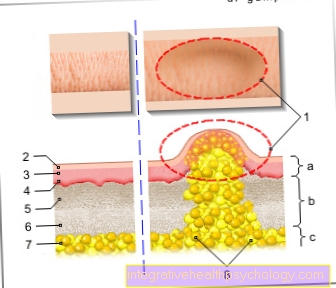The vitamin A eye ointment
introduction
Vitamin A is a particularly important substance for the eyes. It is metabolized and enables vision, as it is essential for the transmission of stimuli. A vitamin A deficiency can lead to poor eyesight and night blindness.
In addition, vitamin A is also found in the tear fluid, where it is used to care for the eyes. For this reason, vitamin A eye ointments have become established for the treatment of dry eyes or diseases of the cornea.

The indications for a vitamin A eye ointment
Vitamin A is essential for eyesight and adequate sebum production. The sebum is formed by special glands and consists of fats and proteins. It is stored protectively over the skin and provides it with additional moisture. In addition, the vitamin A is also found in the tear fluid and cares for the cornea and the connective tissue of the eye. Using vitamin A in the form of an ointment alleviates the symptoms of dry eyes. Patients suffering from what is known as Sicca Syndrome, for example, can benefit from using this ointment. The sicca syndrome describes a complex of symptoms that are associated with dry mouth and eyes, as the necessary glands no longer function adequately.
The ointment can be applied to the eye several times a day - it is particularly recommended to use it at night. It can also provide relief from diseases of the cornea or connective tissue.
Injuries such as chemical burns to the cornea are another medical indication for its use.In this case too, a supply of sufficient moisture is important. In this way, incrustations and sticking can be prevented. Further inflammations or even infections can also be prevented.
Find out all about the topic here: The dry eye.
The effect
Vitamin A is a particularly important vitamin for the human body. It regulates a large number of metabolic processes. For example, it's important for the skin, teeth, bones, and red blood cells.
Vitamin A is important for the eyes because it is converted into the signaling substance rhodopsin. Rhodopsin can pass the stimuli that hit the eye on to the brain. For this reason, vitamin A is of central importance for the visual process. In addition, it regulates sebum production. The sebum is important for the skin as it has a nourishing effect. The ointment can absorb more vitamin A and the skin is protected by the layer that the ointment forms. Vitamin A is also found in the tear film. The ointment stabilizes the tear film and thus has a protective effect. This can provide relief for dry eyes or other corneal diseases. Vitamin A also promotes cell regeneration and accelerates the healing process.
Learn more about the effect of here Vitamin A.
The side effect
After the ointment has been applied, blurred vision may occur as the ointment is very fatty. However, these symptoms should improve a short time later. Another possible side effect is the increased absorption of the vitamin. This can manifest itself as headaches, dizziness and nausea, for example. However, these side effects are very rare and if they do you should tell your doctor.
In addition, vitamin A has a teratogenic effect - it is toxic to an unborn child and can lead to malformations. However, this requires high doses, which are not found in an ointment. Nevertheless, pregnant women should inform themselves before the application and possibly prefer another alternative if they are unsure.
The interaction
There is no general answer to whether there are interactions with the vitamin A eye ointment. This depends on the medication that is being taken. If you are unsure, it is advisable to ask your doctor or pharmacist.
As a rule, however, one can say that the metabolism of the vitamin in the ointment is poorly developed.
The counter-signs
Patients suffering from a known hypervitaminosis A should not use this product, but resort to alternative ointments. Hypervitaminosis is caused by an excessive intake of vitamins. Vitamin A hypervitaminosis can therefore be triggered by excessive consumption of liver, cod liver oil or artificial vitamin preparations. Acute or chronic symptoms of poisoning can occur. For this reason, the body should no longer be burdened with vitamin A supplements.
The dosage
There are various ointments on the market that contain different amounts of vitamin A. For this reason, you should read the instruction leaflet before use or ask your doctor / pharmacist for information.
In general it can be said that the ointment can be used about two to four times a day. It is advisable to apply the ointment directly to the conjunctival sac and rub something in.
The price
The price may vary depending on the product. On average, the price is around five to ten euros.
The alternatives to vitamin A eye ointment
For dry eyes, you can also use other ointments that provide moisture to the eye. For example, ointments with heparin can be used because they stabilize the tear film and thus have a protective effect. In addition, the heparin has a long retention period and can thus contribute to the regeneration of cells. Bepanthen ointment also has similar properties and can help with treatment.
In addition to the ointment, eye drops can also be used. Here preparations that contain hyaluronic acid are recommended. Hyaluronic acid is an endogenous substance that can bind water and in this way strengthens the tear film. Eye drops that contain the herbal remedy Euphrasia (eyebright) can also provide relief.
In addition, it is advisable to comply with general measures. You should drink enough water, ventilate regularly and avoid noxious substances such as tobacco smoke. If you wear contact lenses, you shouldn't keep them in view longer than necessary.
Also read the article: The eye drops for dry eyes.
Can I use it during pregnancy and breastfeeding?
In principle, it can be used during pregnancy, as the vitamin A in the ointment is low-dose and only has a local effect, i.e. on the eye. However, one should be aware that vitamin A is teratogenic - it is toxic to the unborn child and can lead to serious malformations. Vitamin A is also harmful to an infant.
However, for these side effects to occur, vitamin A must be present in high doses, as otherwise it cannot have a systemic effect in the body's circulation. It must also be mentioned that every body reacts differently to the substances and metabolizes them differently. If you are sensitive to vitamin A and you are pregnant or want to breastfeed, its use is definitely not recommended.
In general, it is advisable to consult a doctor and seek advice before using vitamin A ointments. During pregnancy in particular, the body is very sensitive and should not be unnecessarily stressed.
What can you help with dry eyes? Find out more here.





























